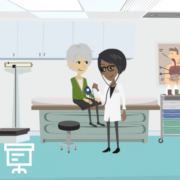MPN Research and Optimism About Curative Therapies
MPN Research and Optimism About Curative Therapies from Patient Empowerment Network on Vimeo.
Myeloproliferative neoplasm (MPN) researcher Dr. John Mascarenhas discusses why he’s excited about the future of care for patients with essential thrombocythemia (ET), polycythemia vera (PV), and myelofibrosis (MF).
Dr. John Mascarenhas is Associate Professor of Medicine at the Icahn School of Medicine at Mount Sinai (ISMMS) and the Director of the Adult Leukemia Program and Leader of Clinical Investigation within the Myeloproliferative Disorders Program at Mount Sinai. Learn more about Dr. Mascarenhas, here.
Related Programs

|

|

|
Transcript
Katherine Banwell:
Before we close, Dr. Mascarenhas, let’s talk about research. Are there new developments that you’re excited about?
Dr. Mascarenhas:
Absolutely. So, what I’m heavily interested in and involved in is clinical investigation and moving the field forward, and there are many people out there that are similarly involved and they’re doing really excellent work. So, I am super jazzed and enthusiastic and optimistic, and it’s what gets me work every day and inspires me is all of the effort that is happening. And, it’s a continuum. So, it’s not just one person trying to try a different drug here and there. It’s really a bringing together of many different people because these are rare diseases.
Many different people from many different institutions that have different areas of expertise, but have a common goal of translating from laboratory informed data, so, not just taking a dart and throwing it at the dartboard and hoping it sticks. But actually taking data that we learned from the lab and leveraging that information to develop therapies that are informed, that are targeted, that are personalized and going through a process of evaluating them to get them into the clinic, with the goal of, and I would say ambitiously, our goal these days is moving beyond trying to make patients feel better, which is an important goal, but it’s really can we really target the disease in a more effective way to induce remissions, to, dare I say, cure patients. So, I think the ambitious goal of the clinical investigators and laboratory investigators that are active in MPN research today is really one looking for an understanding at the basis of the biology of the disease to develop curative therapies. And, I am optimistic that that will happen.
And, I don’t mean happen in a hundred years from now. I mean happen in our lifetime. So, that’s where we’re going. There’s a lot of very exciting drugs, oral and intravenous drugs and they target very different types of aspects of the disease, and I think patients and physicians will see that maybe those drugs are used best in combination. So, the idea of using one drug, waiting for it to fail and using another drug is really old news, and much of oncology is combination therapy. So, taking drugs that have different targets or mechanisms of action and non-overlapping toxicity to try to better target and delete what’s called the myelofibrosis stem cell that’s the basic issue here, which we don’t effectively delete other than transplant. So, our goal would be to put bone marrow transplanters out of business.



